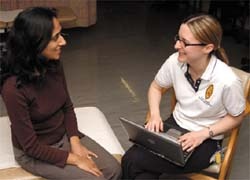TIARA enhances therapists' workflow
By Mark Nicholls
A new IT system, designed to improve the efficiency and effectiveness of the therapy department at the Royal Orthopaedic Hospital (ROH) NHS Foundation Trust in Birmingham, is reported to have shown clear benefits for therapists, managers and patients.

Wireless technology enables the therapists to use laptops or tablet PCs during their rounds. Named TIARA, the new system gives clinicians rapid, easy access to full patient histories and allows details of assessments and interventions to be recorded onto the system.
As one of the busiest orthopaedic centres in Europe, the ROH Trust provides elective surgery to the population of Birmingham and provides a spinal service to the West Midlands. About 65,000 out-patients are seen annually, with 13,000 patients treated as in-patients or day cases.
In terms of therapy services the hospital offers in- and out-patient services, including physio and occupational therapy, rehabilitation and sports medicine and has a busy hydrotherapy service.
ROH Therapy Manager Nikki Mason explained that TIARI replaces three previous systems that were incompatible. Since the system went live last April, implementation has been phased; initially it was used for appointments, registration and collection of statistics and auditing patient attendance. ‘We now have full electronic patient records for inpatient physiotherapy, inpatient occupational therapy and outpatient physiotherapy,’ she said. ‘However, we do not have the system for hydrotherapy because of problems with having laptops in a water environment; we are looking at ways to resolve that.’
Since its introduction, the new IT system for therapists has made significant improvements and seen hand-written notes phased out. It has also helped managers with statistical data, assisted in managing patient flow and seen physiotherapists spend less time on administration. ‘We have a better idea of waiting times and can manage our waiting lists more effectively,’ Nikki Mason added. ‘From the physiotherapist’s perspective there are some patients with more complex needs that cover several areas. Instead of having separate notes in those different areas, the notes are on the laptop and we can see them straight away.’ The therapist can move between patients in wards or consulting rooms, carrying no documents, only the laptop, and clinical records can be viewed by multiple users with appropriate access.
‘The system can detail patient attendance, highlighting for example which patients are poor attendees, so we can address that situation; or identify those patients that are more dedicated to their treatment,’ Nikki Mason pointed out. Data collection and storage is also more formatted and standardised. ‘The system is a lot more auditable and helps us move towards improved evidence-based practice. Ultimately, the patient is receiving an audited, quality service and it is helping us reduce waiting times.’
Security – The laptop will not work away from the hospital; data is all encrypted and it is web-based so there is no data stored directly on the laptop.
Further potential – A next step is to take electronic referrals form GP surgeries and consultants within the Trust.
The hospital reception also has a touch-screen computer check-in system where patients can register, so that members of staff are prepared for their arrival at the relevant department.
20.12.2008





